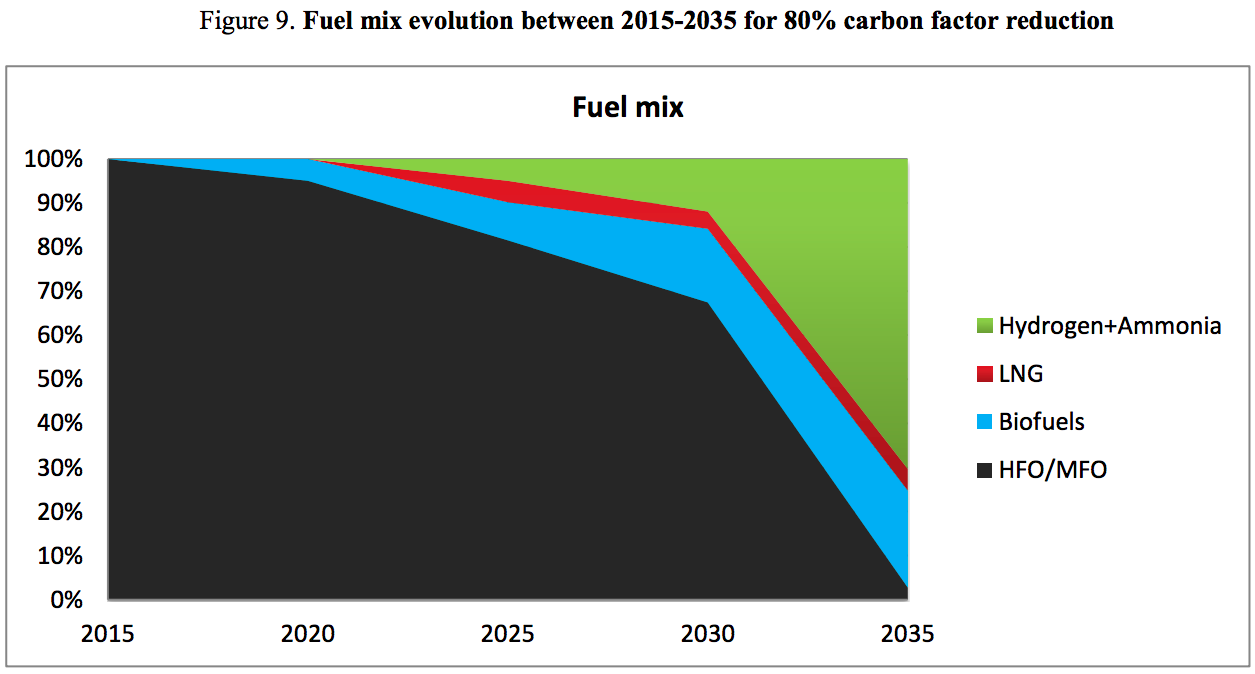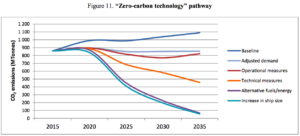Decarbonising Maritime Transport: OECD report sees ammonia fuel enabling carbon-free shipping by 2035
By Trevor Brown on April 06, 2018
Twelve months ago, I wrote here that “the shipping industry is beginning to evaluate ammonia as a potential ‘bunker fuel,’ a carbon-free alternative to the heavy fuel oil (HFO) used in maritime transport.” Around that time, I described the obstacle to adoption of ammonia fuel as an information gap, rather than a technology gap, because no new technology was required: the industry simply did not know about ammonia. This information gap had allowed the industry to believe that “CO2 reduction objectives will only be achievable with alternative marine fuels which do not yet exist.” I’m glad to announce that this information gap is closing, and fast.
According to a report published last week by the International Transport Forum, the OECD’s “think tank for transport policy,” the use of “currently known technologies could make it possible to almost completely decarbonise maritime shipping by 2035.” This conclusion requires the adoption of ammonia as a zero-carbon fuel.
Four different decarbonisation pathways examined for the study would reduce international shipping’s CO2 emissions between 82% and 95% below the level currently projected for 2035 …
Alternative fuels and renewable energy can deliver much of the required reductions. Currently available biofuels should be complemented by other natural or synthetic fuels such as methanol, ammonia and hydrogen. Wind assistance and electric propulsion have shown that they can bring additional reductions.
International Transport Forum – OECD announcement: Decarbonising Maritime Transport by 2035, 03/27/2018
Low-carbon maritime fuel mix: 70% ammonia / hydrogen, 3% heavy fuel oil
One scenario, “estimated by taking into account the uptake of potential alternative fuel such as ammonia,” achieves an 80% reduction in the “carbon factor” of the overall fuel mix. In this scenario, “hydrogen and ammonia will form around 70% of the mix of ship. This, along with the increase in the uptake of biofuels (22%) and LNG (5%), could diminish the use of oil-based fossil fuels significantly to around 3% by 2035.”

This scenario assumes a “high uptake of alternative fuels such as advanced biofuels, hydrogen, and ammonia,” but excludes carbon-based synthetic fuels, even though the report considers methanol in detail. Although methanol is a viable fuel and, unlike ammonia, already commercially demonstrated, its carbon content renders it inadequate to the task of sectoral decarbonization (see our other analyses of carbon-based versus nitrogen-based synthetic fuels).
The commercial viability of ammonia, in both the short-term and the long-term, is an important part of the OECD’s analysis:
Ammonia can offer an attractive short term solution in dual fuel configurations with reasonable commercial viability. In addition, further developments of ammonia as a complement or replacement for HFO can also offer a promising alternative to reduce CO2 emissions in the long term …
There is already significant port loading infrastructure, handling experience and safety know-how.
International Transport Forum – OECD: Decarbonising Maritime Transport: Pathways to zero-carbon shipping by 2035, 03/27/2018
The OECD report also studies fuel production – low-carbon ammonia synthesis – in detail, drawing equally on synthetic fuel life cycle analysis research by the University of Ontario Institute of Technology and economic analysis by the IEA, both of which we have written about extensively. The OECD report concludes that “‘Green’ production of ammonia could hence easily develop where renewable energy sources are abundant.”
Emissions reductions in addition to zero-carbon alternative fuels
In addition to the adoption of alternative fuels, the OECD report considers the full range of potential factors driving the rate of emissions in 2035, including changes in international trade flows, ship design, and operating conditions – which means, primarily, speed. It concludes that “the largest emissions reductions could be achieved via alternative fuels and energy, but technical and operational measures would also be needed to achieve full decarbonisation by 2035.”


Although each of the report’s decarbonization pathways is broadly similar, relative to the business as usual benchmark, in its “zero-carbon technology” pathway, “the use of electric ships and zero-carbon fuels will be the key measure to reach a 92% emission reduction by 2035. The combination of these measures will help to bring CO2 emission levels down to 56 million tonnes.”
This report examines what would be needed to achieve zero CO2 emissions from international maritime transport by 2035. It assesses measures that can reduce shipping emissions effectively and describes possible decarbonisation pathways that use different combinations of these measures. In addition, it reviews under which conditions these measures could be implemented and presents concrete policy recommendations.
International Transport Forum – OECD: Decarbonising Maritime Transport: Pathways to zero-carbon shipping by 2035, 03/27/2018
Last week, OECD. Next week, IMO
The purpose of last week’s report from the OECD and other reports, including the recent Lloyd’s Register report and ongoing analysis by the IEA, is to inform policy in order to drive decarbonization and the adoption of alternative fuels across the shipping sector.
As the information gap closes, policy is now evolving fast.
Tomorrow, the IMO’s Intersessional Working Group on Reduction of GHG Emissions from Ships will conclude its third meeting, when it expects “to finalize the text of the draft initial strategy.” On Monday, this initial strategy will be presented at the 72nd meeting of the IMO’s Marine Environment Protection Committee (MEPC). The first item on MEPC’s five-day agenda is the “Reduction of greenhouse gas emissions from ships.”
The MEPC is expected to adopt an initial strategy on the reduction of GHG emissions from ships.
The initial strategy will be a framework for Member States, which is expected to set out the future vision for international shipping, the levels of ambition to reduce GHG emissions and guiding principles; to include candidate short-, mid- and long-term further measures with possible timelines and their impacts on States as well as identify barriers and supportive measures including capacity building, technical cooperation and R&D.
International Maritime Organization, Marine Environment Protection Committee (MEPC), 72nd session – Media Information